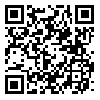Fri, Feb 20, 2026
| فارسی
Volume 11, Issue 4 (Winter 2010)
Advances in Cognitive Sciences 2010, 11(4): 63-74 |
Back to browse issues page
Download citation:
BibTeX | RIS | EndNote | Medlars | ProCite | Reference Manager | RefWorks
Send citation to:



BibTeX | RIS | EndNote | Medlars | ProCite | Reference Manager | RefWorks
Send citation to:
Rezaei A, Aghazadeh E, Mohammadzadeh A. Relationship between Epistemological and Motivational Beliefs in Students with Cognitive Engagement. Advances in Cognitive Sciences 2010; 11 (4) :63-74
URL: http://icssjournal.ir/article-1-72-en.html
URL: http://icssjournal.ir/article-1-72-en.html
1- Scientific Faculty, Tabriz Payam-e- Nour University, Tabriz, Iran.
2- Scientific Faculty, Tabriz Islamic Azad University, Tabriz, Iran.
3- Scientific Faculty, East Azarbayjan Payam-e-Nour University, Tabriz, Iran.
2- Scientific Faculty, Tabriz Islamic Azad University, Tabriz, Iran.
3- Scientific Faculty, East Azarbayjan Payam-e-Nour University, Tabriz, Iran.
Abstract: (3875 Views)
Objective: The purpose of conducting this research was to investigate the relationship between epistemological beliefs (belief in simplicity of knowledge, certainty of knowledge, source of knowledge, innate ability in learning, and quick learning); motivational beliefs (mastery, performance, extrinsic goal orientation and self efficacy) and identifying the relative contribution of each in the prediction of cognitive engagement in students.
Method: 316 students of Tabriz Islamic Azad University (201 females and 115 males) were randomly selected using one stage sampling, and completed the epistemological, goal achievement and motivational strategies for learning questionnaires. Data were analyzed using multiple regression analysis and Pearson’s correlation test.
Results: Results indicated that cognitive engagement was positively correlated with self efficacy and mastery, goal orientation performance, and certainty of knowledge; and negatively correlated with extrinsic goal orientation, quick learning and innate ability in learning.
Conclision: Also, results revealed that self efficacy motivational beliefs is the best predictor factor of students’ cognitive engagement, and goal oriented mastery, certainty of knowledge, gender and innate ability in learning ranked thereafter. Innate learning ability had a negative relationship with and inhibitory effect on cognitive engagement.
Method: 316 students of Tabriz Islamic Azad University (201 females and 115 males) were randomly selected using one stage sampling, and completed the epistemological, goal achievement and motivational strategies for learning questionnaires. Data were analyzed using multiple regression analysis and Pearson’s correlation test.
Results: Results indicated that cognitive engagement was positively correlated with self efficacy and mastery, goal orientation performance, and certainty of knowledge; and negatively correlated with extrinsic goal orientation, quick learning and innate ability in learning.
Conclision: Also, results revealed that self efficacy motivational beliefs is the best predictor factor of students’ cognitive engagement, and goal oriented mastery, certainty of knowledge, gender and innate ability in learning ranked thereafter. Innate learning ability had a negative relationship with and inhibitory effect on cognitive engagement.
Type of Study: Research |
Subject:
Special
Received: 2009/08/23 | Accepted: 2009/10/23 | Published: 2009/12/22
Received: 2009/08/23 | Accepted: 2009/10/23 | Published: 2009/12/22
Send email to the article author
| Rights and permissions | |
 |
This work is licensed under a Creative Commons Attribution-NonCommercial 4.0 International License. |



